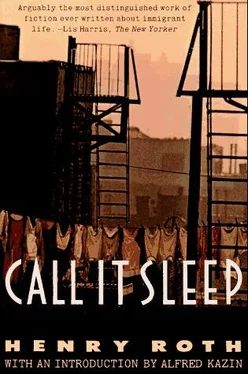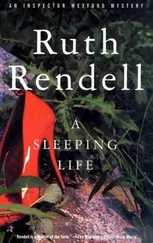“Look David!” Without getting up from her chair, Aunt Bertha was craning her neck to stare out into the street. “Come here. Look how they’re hauling that box.”
David drew near the window, looked down. In the dull street below, their shouts muffled by the window, a swarm of boys of various heights and ages now dragged, now tumbled a bulky packing-box along the gutter, and in their eagerness to lend a hand, impeded one another, shoved one another out of the way, shook fists and forgot about it promptly and grappled with the box again.
“What are they yelping about?” his aunt inquired. “Whose wood is it?”
“It’s nobody’s,” he enlightened her. “It’s ‘Lection’ wood.”
“What do you mean ‘Lection’ wood?”
“They’re going to burn it on ‘Lection’ day. They always make a big, big fire on ‘Lection’ day. That’s where Papa went. There’s pictures on the barrels and all the beer saloons.”
His mother turned from the air-shaft window. “I’ve seen it in Brownsville too, in the open lots. Such is the custom here. To make a fire on the day they vote — it falls on Tuesday. Is Nathan a citizen, Bertha?” she asked placatingly.
“Yes, of course!” Aunt Bertha’s tone was still sulky, the movement of her shoulders as she turned brusquely toward the window again, still offended. “What else!”
Seeing the queer hopeless lift of his mother’s brow, David again resolved to go down. Whatever it was that caused this tension, and it was the most determined he had ever seen between his aunt and his mother, it was not only baffling but disagreeable. Yes. He would go down.
“Well, why are they dragging it now?” Aunt Bertha turned to him peevishly. “Are they going to burn it for a taste of what’s to come?”
“No. They hide it,” he said self-defensively. “In a cellar. It’s in 732 cellar and 712 cellar near where the rabbi is. But yesterday, big men came and a street cleaning wagon, a brown one, and took it all away.”
“And now they’re getting more! Bah! American idiots! Pull their bowels out for a fire in the street they’ll never make. But when it comes to dragging wood for their mothers, they’re too lame, ha? And you!” she demanded accusingly. “Do you haul wood?”
“N-no,” he lied. It was true though that he hadn’t helped get election wood more than once or twice.
“Hum-m-m!” Aunt Bertha sighed with boredom and glanced at the clock. “An hour and a half before my nosey one comes. I feel lonely.”
“Listen to me, Bertha,” his mother said in a suddenly strained voice as though she had resolved upon a step but prayed it wasn’t necessary. “Do you really want to hear?”
David’s heart tripped with excitement. Better go down, his mind warned almost dizzily. Better go down. But instead, he dropped to his knees and crawled vacantly toward the stove.
As if jabbed with a pin, Aunt Bertha had wheeled around half-leaping from her chair. “Do I want to hear?” she exploded. “A question! After these months of asking? Do I want to hear!” She stopped suddenly. Her look of avid interest gave place to one of apology and self-reproach. “No, no, sister! If it’s difficult for you, then say nothing. Don’t even begin! Really I’m ashamed of myself for plaguing you.”
“There’s nothing to be ashamed of,” his mother’s smile was at once bitter and forgiving. “One has to speak of these things sometimes. I don’t know what possesses me to want to keep them sealed up so tight.”
“And as I’ve said to you a thousand times,” Aunt Bertha urged reasonably, persuasively, bridling her eagerness. “It was all so long ago, it should be a jest to you by now. And whatever it is, can it frighten me? I know you, sister, how good of heart you are. Too great a wrong you couldn’t have done.”
“It was great enough. Enough for one life-time.”
“Yes?” Aunt Bertha scratched her back against the back of her chair. “Yes?” She settled down receptively.
“There are only three people who know,” she began with an effort. “Mother, father, myself of course, and — and another — in part. I shouldn’t want—”
“Oh! No! No! No! Trust me, Genya.”
David squirmed, shivered with anticipation, fear.
“You remember,” she began and then stopped, her eyes meeting his from where he gazed up at her. “Let it be so.”
The oblique nod of her head seemed to beckon her sister to join her in the realm of another speech. For when she spoke again her words had fused into that alien, aggravating tongue that David could never fathom. Chagrined, he looked at Aunt Bertha. She was leaning forward eagerly the better to devour all that was said, her mobile features sometimes aping his mother’s, sometimes contradicting. Her eagerness tantalized him, goaded him into sharper listening. It was no use. He scrutinized his mother. The color had risen in her throat. Now her eyes stared and were dark and she spoke rapidly. Now they narrowed and the wide brows knit crookedly. Pain. What hurt her? Now she sighed and dropped her hand and her face grew slack and mournful and her slow lids heavy. What? But though he pried here, there, everywhere among the gutturals and surds striving with all his power to split the stubborn scales of speech, he could not. The mind could get no purchase.
Sullen, resentful almost to tears, he rolled over on his back, stared at the ceiling. He didn’t care, that’s all. He wouldn’t tell her anything either. There! He was going down, that’s what he would do. Never tell her anything — But — Listen! That was a yiddish word! A whole phrase! “After the old organist, dead” … Another! “Alone in the store” … A word! “Handsome” … Like mica-glints in the sidewalk, another phrase! “A box of matches” … He turned stealthily to watch her.
“And he seized my hand.” A whole sentence emerged.
Aunt Bertha, who with hand on cheek had been shaking her head in a shocked manner, now beat the air angrily with her fists. “Even if he was educated,” she exclaimed heatedly, “and even if he was an organist, he was a goy! And right then and there you should have sent him looking for his teeth!”
“Hush!” she said warningly and again blotted out import under a screen of Polish.
A little ashamed of himself, but secretly gratified nevertheless, David looked vacantly away. Here at last was something to brood on, perhaps even to worry a meaning out of, certainly to remember. A goy, Aunt Bertha had said, an ‘orghaneest’. What was an ‘orghaneest’? He was educated, that was clear. And what else, what did he do? He might find out later if he listened. So he was a goy. A Christian. They didn’t sound the same. Christian. Downstairs, the janitor was a Hungarian. Christian too. Chrize. Jesus Chrize they said down stairs. Chrize. Christmas. School-parties. Then long ago, remember? Yussie. See him on the stairs, white-iron arrows white-iron, Annie, leg. Christmas. Then no school. Gee! Yea! And new calendars, remember? Lots of pages. Christmas. Jesus Crotzmich, the grocery man said and he always laughed. Crotzmich means scratch me. Jesus scratch me. Funny. And why did Aunt Bertha say hit him? Because he was a goy? She didn’t like goyim. But mama? She did. Wonder? Who was he?
He turned to regard his mother. When would another phrase break from that alien thicket? He waited impatiently, mind beating the coverts … Nothing … Like a fabric the unknown speech flowed on riftless, opaque, until—
“Bah!” Aunt Bertha sheared it with contempt. “All these rogues have tongues on castors!”
“My fault as well!” protested his mother, reverting to Yiddish in forgetful haste. “Toward May I grew so, I spent the whole day waiting for a half hour at twilight. How many times a day did I wish it were winter, mid-winter when the moon is yellow before five. Long before sunset, I was already at the store, and it was all I could do to keep from reminding father to hurry off to the synagogue.”
Читать дальше












